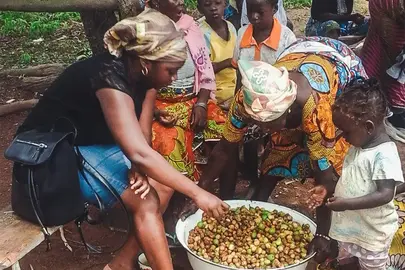Cocoa and Shea Value Chains in Ghana: Interview with Adjoa Annan, Doctoral researcher at ZEF
January 08, 2020.
Adjoa Annan is a doctoral student at the Ghanaian-German Centre for Development Studies, which is a collaboration between ZEF and the Institute of Statistical, Social and Economic Research (ISSER), University of Ghana, Accra. The centre and Adjoa's research is funded by the German Academic Exchange Service (DAAD).
Currently you work on a study of the cocoa and shea value chains in Ghana. Could you please tell us a little bit about your research?
This study tries to understand how quality is promoted or non-promoted in food and agriculture value chains. It uses the cocoa and shea value chains of Ghana as case studies. The cocoa sector is state regulated and quality is highly controlled by the marketing board, whereas the shea sector is privately driven with control of quality in the hands of private firms and actors. The initial focus of the study was to understand the knowledge exchange and innovation diffusion on quality enhancement technologies in the sectors. However, during data collection, it was observed that, knowledge exchange on quality enhancement did not play a central role in promoting quality. Buyers in the sectors were more concerned with controlling sourcing commodities and implementing mechanisms in purchasing commodities. Quality enhancement was not highly innovative and its uptake was low, with some producers resisting innovations. As such, the current focus of the study examines the power relations and control of quality in the upstream (i.e. production, farm gate level) and downstream (i.e. end-market) segments of the chains. A disconnect in the promotion of quality in the cocoa and shea value chains was noticed. This serves a double function; whereas in the downstream of the chains it is promoted as a branding and marketing tool, in the upstream, it is promoted as a control and sourcing tool.
When we look at the value chains of agricultural products from Africa, often the raw materials are harvested there, but lots of the refinement takes place elsewhere. What is the potential for the industry of luxury goods, such as confections and cosmetics, in Ghana?
Efforts are being made to strengthen origin processing and to promote locally owned processing and manufacturing companies in the country. The Ghanaian government seeks to increase its share of processed cocoa beans into intermediate products such as cocoa butter, liquor and powder as well as chocolate from 40 to 50 percent. With respect to shea, Ghana is the hub of shea processing in West Africa and is trying to expand shea production to sustainably meet its processing capacity. There is an increase in chocolate consumption among Ghanaians because of sensitization and educational programs implemented over the past years. Shea is domestically consumed and its use in beauty and hair products is gaining momentum in Ghana. However, to maximize profits in both value chains, in my opinion, Ghana should increase its trading of intermediate cocoa and shea products. Ghana could also benefit by the marketing and branding of Ghanaian chocolate or confections and shea luxury products in the regional, African, and international markets. I believe these efforts could contribute to increasing margins and profits. More so, producers participating in these value chains could capture higher values if policies were to target the alleviation of poverty by, for example, increasing prices.

What is your personal motivation for your doctoral research?
After my undergraduate and master’s research on agriculture and rural development, I observed that producers in value chains capture little of the overall value. For my PhD I wanted to further understand why producers who integrate into international markets remain poor, especially producers who participate in value chains where the production of a quality commodity is portrayed as rewarding.
What are the advantages of the collaboration between ZEF and ISSER, and how does this contribute to your research?
I think such collaboration provides opportunities for knowledge exchange between the various institutions, countries and students. It also provides the opportunity for aspiring PhD candidates to contribute towards possible solutions to developmental issues in Ghana. ZEF offers a sound academic as well as a friendly environment for international students and in my opinion, Bonn is one of the best places to have an intercultural experience.
The Interview was conducted by Andreas Haller


